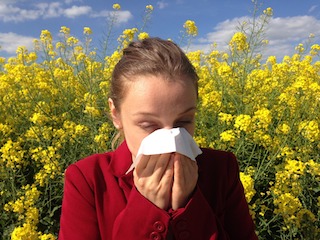
Seasonal allergy affects many people in different areas. It may be caused by pollen from flowers and trees or mould and dust.
Seasonal allergy is usually characterized by inflammation of nasal membranes, which cause symptoms such as sneezing, wheezing, nasal congestion, itchy and watery eyes, itchy throat or coughing.
Most allergy medications are available over-the-counter at pharmacies. However it will be to your benefit if a healthcare practitioner makes the diagnosis, since other conditions such as cold and asthma might be mistaken as seasonal allergies.
If you suffer from seasonal allergies the best recommendation is to avoid the allergen, which is the cause of allergic reaction. But this is not always possible so we would suggest other practices such as wearing protective masks outside, wearing sunglasses outdoors, using HEPA filters in air conditioner, washing your hair daily, checking dogs for pollen or rinsing them off before entering home.
Even if you try these measures you might still have episodes of allergic reaction. Here are some of available treatments to reduce the symptoms:
Oral antihistamines will help relieve allergic symptoms by preventing release of histamine during an allergic reaction. Older antihistamines such as diphenhydramine will cause more drowsiness and sometimes interact with other medications you might be taking. Newer generations such as Allegra or Claritin are supposed to cause less drowsiness and less likely interact with other medications.
Nasal sprays such as Flonase or Nasonex are corticosteroids and reduce inflammation of nasal passages. Combination of oral antihistamines and nasal corticosteroids appears to be very effective in treatment of seasonal allergies or allergic rhinitis.
Oral decongestants are generally used for a short period and reduce nasal stuffiness by decreasing the swelling of nasal passages but they might increase your blood pressure or heart rate. Decongestant nasal sprays should not be used more than three days in a row as they might cause rebound congestion, which makes the condition worse.
Cromolyn sodium nasal spray and montelukast are among other medications used to control allergic rhinitis symptoms. Allergy shots, which are usually done by immunologists, are longer-term solutions for seasonal allergies.
Sepideh Nasafat, PharmD
Registered Pharmacist
Contact MEDMAIL to learn what measures suit you best and how we can provide them for you.

Have Your Say